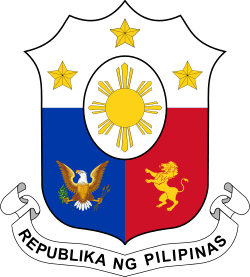Batasang Bayan
The Batasang Bayan (English: Legislative Advisory Council) was the consultative assembly and legislative advisory council in the Philippines that helped formulate decrees promulgated by Ferdinand Marcos from its inauguration on September 21, 1976 to October 30, 1978.
 |
|---|
| This article is part of a series on the politics and government of the Philippines |
|
|
|
Constitutional commissions |
|
Related topics |
|
|
Batasang Bayan | |
|---|---|
| Philippines | |
| Type | |
| Type | Consultative |
| History | |
| Established | September 21, 1976 |
| Disbanded | October 30, 1978 |
| Preceded by | Congress of the Philippines |
| Succeeded by | Interim Batasang Pambansa |
| Seats | 128 members; appointive |
| Meeting place | |
| Philippine International Convention Center | |
| Footnotes | |
| Though there were about 128 members of the Council, it is unclear how they voted on resolutions or were given voting rights at all since all law-making powers was vested with the President. | |
"As such powers and functions shall consist of but not limited to assisting and advising the President of his lawmaking functions, providing a forum for the citizenry, through the herein designated representatives, to ventilate their views on national issues, as well as their opinions on the manner of administering the affairs of the government, providing a forum for the rationalization, unification, and clarification on the policies and programs of the Executive Branch of Government and providing a mechanism for actually conducting a review of the structures, policies and efficiencies of the different Barangays and Sanggunians and submit its finding and recommendations to the President as mandated by the 1973 Constitution as the Philippines shifted from a presidential to a parliamentary form of government and Presidential Decree No. 995.[1]" It held its regular and special sessions at the Philippine International Convention Center.
Sessions
- Regular Session: September 21, 1976 – October 30, 1978
Functions
The Batasang Bayan functioned as a legislative advisory council to the President on legislative matters. Powers and functions consisted of:
- Assisting and advising the President of his lawmaking functions;
- Providing a forum for the citizenry, through the herein designated representatives, to ventilate their views on national issues, as well as their opinions on the manner of administering the affairs of the government;
- Providing a forum for the rationalization, unification, and clarification on the policies and programs of the Executive Branch of Government;
- Providing a mechanism for actually conducting a review of the structures, policies and efficiencies of the different Barangays and Sanggunians and submit its finding and recommendations to the President.
Members
The Batasang Bayan was composed of 128 members, all appointive. Representation came from the highest government entity down to the smallest local government unit (barangay) and the marginalized sectors of society. Particularly, it was composed of the following:
- President of the Republic of the Philippines, the members of the Cabinet, including officials with the rank of Cabinet.
- Provincial governors, city mayors, presidents of regional associations of Barangay and Kabataang Barangay Councils.
- Sectoral representatives of professional, capital-industrial and agricultural.
See also
References
External links
- "History of the Senate". Senate of the Philippines. Archived from the original on May 2, 2007. Retrieved April 1, 2007.
- "The LAWPHiL Project - Philippine Laws and Jurispudance Databank". Arellano Law Foundation. Archived from the original on September 1, 2006. Retrieved September 16, 2006.
Further reading
- Philippine House of Representatives Congressional Library
- Assembly of the Nation. Studio 5 Publishing, Inc.
- The Presidents of the Senate of the Republic of the Philippines. ISBN 971-8832-24-6.
- Pobre, Cesar P. Philippine Legislature 100 Years. ISBN 971-92245-0-9.